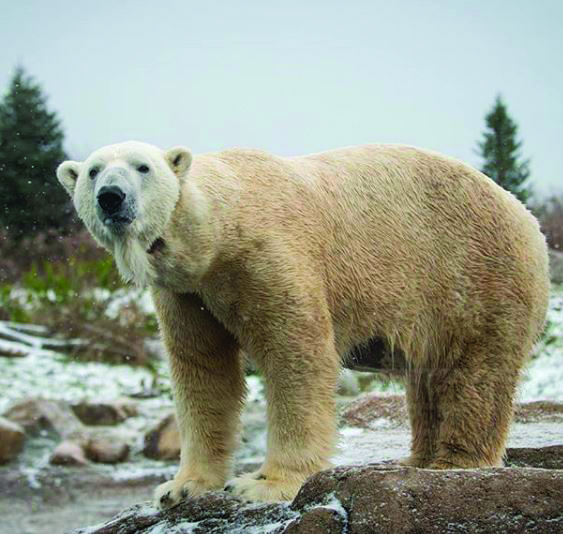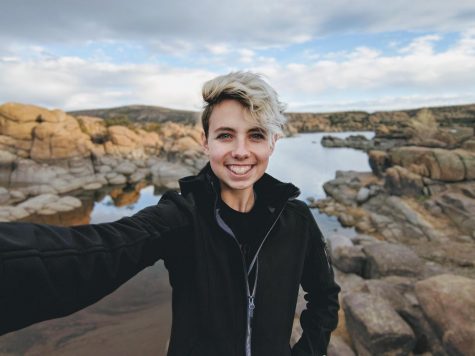Every week a STEM lecture is held on San Diego Mesa College campus and is open to the public. Climate Reality Leadership Corps, founded by Al Gore, spoke at Mesa Community College Feb. 26 educating students on the different features of climate change, as well as the disasters that have developed alongside the issue.
Dr. Cherry Robinson, the chairperson for the San Diego Chapter of the Climate Reality Leadership Corps, started the lecture called, “The Climate Reality Project” with a simple statement. “Even if you don’t believe in climate change,” she said, “what’s the worst that can happen when we take care of our planet?”
Throughout the lecture, she made sure to remind everyone that our planet is our home. “The air Australians breathe is the air we breathe,” she continued, “the water that South Africa drinks will eventually be the water we drink, too. This is all our home. We need to take care of it.”
The first question she asked the audience was, “Must we change?” Robinson found this question most worthy of our time. The accumulation and extremity of natural disasters in recent years is comparable to the analogy about a frog in a boiling pot of water. If you put a frog in a boiling pot of water it will know it is too hot a jump right out. However, if you put a frog in the pot and then turn the burner on, bringing it to a slow boil, the frog will acclimate and never jump out.
“This is what we are doing to ourselves, and we don’t seem to mind that it’s a little hotter,” Robinson was frustrated at the sigh she heard from the crowd.
Robinson recalled 2017 frequently during the lecture. From July to September, the entire world was under extreme weather conditions — most notably, hurricanes Harvey, Irma, and Maria. During that period, the west coast was on fire, China was flooding, and Australia was on fire.
Robinson also mentioned that “Not only are these disasters results from our changing climate, they signal the health of it overall.” She added, “The health is not looking good at all.” The damage from the disasters in the U.S. cost about $306 billion. The previous cost record set was at $90 billion, resulting from Hurricane Katrina in 2005.
The next question was “Can we change?”
It is extremely clear that huge change has been made to fight climate change when we see what technological advances have occurred. Notably mentioned in the lecture, in 2016, solar energy production exceeded the projection laid out in the early 2000s by 75 times. In 1976 the cost of solar cells was $79.40/watt, now the cost is $0.41/watt.
“These savings are extreme, we need to keep going. Keep making it better and cheaper to save our home,” said Robinson with a hopeful tone and smile, “There was a time when no one wanted to go to LED lights and now we are projecting 95% of households will be using them! That is compared to the 1% back in 2010.” There is much hope in seeing how far we have already come and the investment the people have started to make for Earth’s future. “We are already changing, so the answer is clear to ‘can we change?’”
A panel speaker and lawyer, Lori Mendez, had quite a few reusable products to show the audience, pulling them from a bag she keeps in her fully electric car. “I carry a mug for when I am invited out to coffee. When I get food to-go, I bring my own container for them to use. I have reusable chopsticks.”
After the lecture I conducted an interview with Mendez and she told me, “You cannot fix everything yourself. We each have to pick something and go that direction, I picked single use plastics (SUPs) and I ran with it. I am aware, educated and picked something that I can make an impact in.”
Finally, Robinson asks, “Will you change?”
“Since 2015, there have been 175 countries that signed on the Paris Agreement. This agreement is within the United Nations Convention and deals with GHG emissions mitigation, finance and adaption. It’s also good to note that the U.S. and China account for 40 percent of the emissions worldwide,” Robinson added.
Mendez states it as, “You have a voice, you have a choice.”
So, will you change?
If you are interested in learning more about The Climate Reality Project, or want their members like Robinson and Mendez to speak at an event, contact Cherry Robinson at (619) 884-3613, or cherry@TheClimateRealityProjectSanDiego.com. You can also check out TheClimateRealityProjectSanDiego.com




